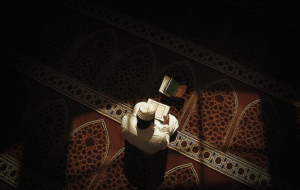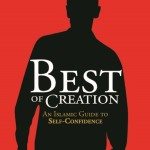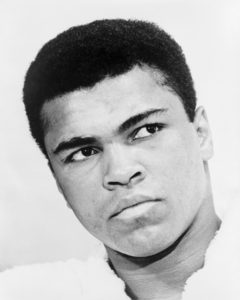The Mindful Muslim – Guest Post by Hannah Morris
Think of a big yellow truck. The biggest, brightest, yellowest truck you can imagine.
Have you got that picture clear in your mind now?
How many times have you thought about a bright yellow truck like this in the last few days?
Now, grab a stopwatch, or just your watch will do, and time 1 minute. For that 1 minute, your challenge is to not think of that big yellow truck…
Times up! Did you do it? If you are like most people then probably not. How many times did you think of the big yellow truck in the last minute? How many times have you thought about a bright yellow truck in the last few days? Probably not at all.
Trying not to think
Most people find themselves thinking about things they are trying not to. This is why it is likely that you didn’t think of a bright yellow truck at all in the last few days. Because you were not trying to suppress this thought. In the last minute, however, you were trying not to think about it. So it most likely it kept coming to your mind as you tried to stop it.
In fact, ironically, people often find themselves thinking about something even more when they are purposefully trying not to think about it. It is this kind of thought pattern that can lead to psychological and emotional burnout. This emotional burnout can be detrimental not only in managing the difficult situation, but will spill over into all areas of life too such as relationships and work. It will also hinder the ability to think rationally of all available options in times of crisis.
We know from research that our emotional reactions can have a significant effect on our health. It is easy to manage our emotional system when life is going well, but it becomes very hard when life gets difficult.
Of course, there are times when it is best to try and avoid a thought or feeling. Therapists will work with their clients to work out ways of helping them to change their maladaptive thought patterns. But there are also times when it is useful to simply accept the thoughts and feelings and simply allow them pass.
Dealing with difficult thoughts
Avoiding difficult thoughts and feelings can be a lot of hard work and can often only add to the distress that is faced anyway. Facing them, whilst uncomfortable at first, can in many cases, be a way to speed up the process of acceptance and recovery. It can encourage more adaptive thought processes about how to regulate emotions and thoughts regarding a difficult situation.
Fighting emotions will only contribute to this feeling over being overwhelmed by emotions. Because you will be fighting so many at once, especially in the initial stages. Avoiding them means you might actually be completely unaware of which emotions you are actually feeling. How can you address them if you don’t know exactly why you’re thinking and avoiding?
You might be putting so much effort into pushing the bad emotions away that you are also pushing away any good feelings you have also. If you don’t allow yourself to experience emotion and thoughts, this will happen. Allowing yourself to experience it means you are in control and therefore you are reducing the impact of a difficult situation. When you focus so hard on avoiding and blocking out bad emotions it is possible to completely overlook anything pleasant in your life.
Of course, it’s natural to want to defend yourself and avoid unpleasant situations, but this can create a defensive or reactive response to the situation. Awareness and acceptance is another way to respond to a difficult situation too. Being aware and accepting opens you up to more opportunities that may be more rational and proactive, ultimately resulting in a more healthy and adaptive response in many difficult situations.
Psychological research has found this approach to be particularly useful for people managing the psychological response to chronic physical illness such as asthma, arthritis and cancer for example (Bohlmeijer et al., 2010; Grossman et al., 2004 to name a couple). Quite often thoughts relating to the illness are actual facts and therefore it is less useful to challenge such thoughts and subsequent feelings.
Acceptance
Islam teaches us about the importance of acceptance of Allah’s Will and we can apply this to acceptance of our thoughts and feelings too.
“Say, “Never will we be struck except by what Allah has decreed for us; He is our protector.” And upon Allah let the believers rely.” (Qur’an: 9:51)
This can help us to move through the process of accepting difficult situations that Allah may send our way. Certainly, sometimes these thoughts might be those we know are not useful such as ingratitude and the ‘why me?’ response.
We all go through these feelings in the face of adversity at some point. Accepting such thoughts and feelings as a normal initial response is quite ok and can facilitate the move to more adaptive thoughts about the situation that are compatible with our Islamic beliefs.
Incompatible Thoughts
It might be that these thoughts and feelings are those that you know to be incompatible with Islam. Waswas, for example. Using this approach of acceptance, lets you simply notice the thoughts and feelings.
Pay attention to them and let them pass, rather than fighting them, especially because as you now know, the more you try to push them away the more you think about them. Besides, how do you even really know if they are good or bad feelings/thoughts if you keep pushing them away and don’t let yourself actually experience them?
Allowing yourself to experience these thoughts without putting huge efforts into fighting them will allow them to pass more quickly and easily, leaving you with the energy to worship Allah more devoutly than if you drain yourself fighting such thoughts. Rather than beating yourself up about the thoughts, accept them, see them from an Islamic perspective. Notice the thoughts and feelings, and allow them to pass rather than using all your energy to fight them, which can at times in fact only make these feelings stronger.
So, next time you’re facing difficult times and notice yourself fighting hard to avoid the negative thoughts and feelings, give yourself a break. Try giving yourself the space to allow yourself to observe these thoughts and feelings. (including the good ones) Give yourself the mental energy to manage your response to difficulty in a more adaptive and effective way.
Hannah Morris holds a Masters in Health Psychology and Psychological Science. She has a history of working in psychiatric facilities for adults with enduring mental health problems. Hannah is currently counselling and teaching Psychology with Islamic Online University. She is the Founder of Active Mind Care.
References
Bohlmeijer, E., Prenger, R., Taal, E., & Cuijpers, P. (2010). The effects of mindfulness-based stress reduction therapy on mental health of adults with a chronic medical disease: a meta-analysis. Journal of psychosomatic research, 68(6), 539-544.
Grossman, P., Niemann, L., Schmidt, S., & Walach, H. (2004). Mindfulness-based stress reduction and health benefits: A meta-analysis. Journal of psychosomatic research, 57(1), 35-43.
Learn confidence the Islamic Way with our exclusive eBook: Best Of Creation


 Ramadan 2016 Special Prices
Ramadan 2016 Special Prices






